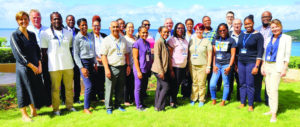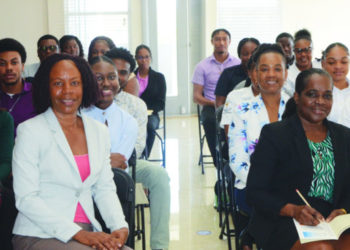
Antimicrobial Resistance (AMR) occurs when bacteria, viruses, fungi and parasites change over time and no longer respond to medicines making infections harder to treat and increasing the risk of disease spread, severe illness and death. According to the World Health Organization (WHO), AMR is associated with an estimated 4.95 million deaths per year and ranks among the top 10 global public health threats facing humanity today.
The main drivers of antimicrobial resistance include the misuse and overuse of antimicrobials; lack of access to clean water, sanitation and hygiene (WASH) for both humans and animals; poor infection and disease prevention and control in health-care facilities and farms; poor access to quality, affordable medicines, vaccines and diagnostics; lack of awareness and knowledge; and lack of enforcement of legislation.
Considering this important issue, the UK Health Security Agency (UKHSA) UK Overseas Territory Programme facilitated a workshop for the Caribbean UK Overseas Territories which was held here in Anguilla from November 29th to December 1st. It consisted of parallel sessions at the La Vue conference room for non-laboratory personnel involved in antibiotic prescribing and stewardship and practical training sessions for laboratory staff which were conducted at the Princess Alexandra Hospital.
Topics presented and discussed during this three-day conference included but were not limited to:
• Antimicrobial susceptibility testing – challenges and diagnostics
• Antibiotic stewardship
• Infection control implications of AMR for the health services
• Choosing the most appropriate antimicrobial therapy
Attendees included 16 multidisciplinary professionals from Anguilla, Montserrat, Turks and Caicos, Bermuda, Cayman Islands, British Virgin Islands. Marcelo Galas, a representative from the Washington office of the Pan American Health Organization (PAHO) was also in attendance to discuss PAHO’s role in supporting antimicrobial stewardship in small territories. The laboratory sessions were also supported by Geoffrey Benjamin, a Senior Biomedical Scientist from the St Helena Government.
This activity was funded by the UK FCDO Conflict, Stability and Security Fund (CSSF) Governance Programme via the UKOTs Programme. Special thanks is expressed to the UKOTs Programme at UK Health Security Agency for the facilitation of the workshop and for the continued technical support to the UKOTs. Thanks is also expressed to the colleagues of the Health Authority of Anguilla, Hughes Medical Centre Medilab and the visiting delegates from the other UKOTs for their participation in this important initiative.










